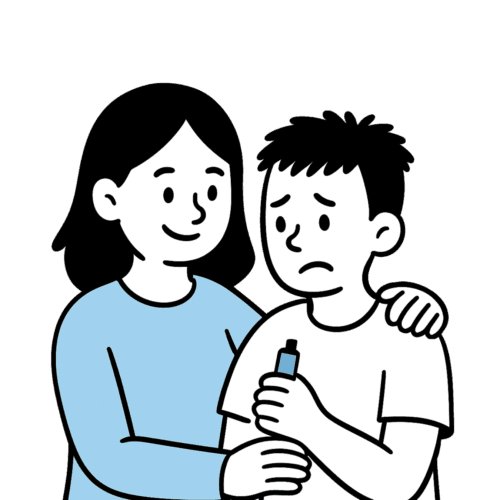
Tiffany, 54, has lived in Cardiff all her life and now calls Llanishen home. She works as a …
Tiffany, 54, has lived in Cardiff all her life and now calls Llanishen home. She works as a …
John Weatherbed from Newport was just 14 years old when he smoked his first cigarette. Like many people …
The Senedd has voted to support the Legislative Consent Motion for the Tobacco and Vapes Bill, marking a …
The Wales Tobacco Control Alliance is calling on Members of the Senedd to back the Legislative Consent Motion …
New findings from ASH Wales’ Annual Adult Population Survey 2025 show strong public support for tougher tobacco laws …
Parents and carers across Wales are facing new challenges when it comes to nicotine. Whether it’s disposable vapes, …

If your child is vaping, smoking or using nicotine pouches regularly and finding it hard to stop, you might be feeling overwhelmed. You’re not alone. These products are made to be addictive especially for young people. What matters now is that your child knows they have your support, and that there are ways to move forward.
Nicotine works by creating a cycle in the brain. It gives a short burst of relief or pleasure. That feeling wears off quickly, leaving the brain craving more.
That craving feels uncomfortable. It can cause stress, irritability or anxiety. So the person reaches for another vape, pouch or cigarette not to feel good, but to feel normal again.
That’s what makes nicotine so addictive. It doesn’t just create a habit it changes the way the brain responds to stress and comfort. Over time, the brain links nicotine with relief, even if it’s only temporary.
Your child may not be vaping for fun anymore. They may be vaping to stop feeling bad. That’s what addiction does and why it’s so important to offer support.
Understanding this can help you respond with more patience especially when your child is struggling or slipping up.

Not every young person who uses nicotine is addicted. Some are experimenting. But there are signs that suggest it’s become a regular habit or dependency. If you’re seeing a few of these, it’s likely their body and brain have started to depend on nicotine.

They seem irritable or anxious when they haven’t used anything for a while

You’ve noticed sneaking, hiding, or going out of their way to use something

They say they want to stop but can’t

They use first thing in the morning or very regularly throughout the day

They get defensive or upset when the topic comes up

They’ve tried stopping before but gone back to it quickly
If your child is finding it hard to stop, they may already feel stuck, frustrated or ashamed. They might be scared they’ve let you down. Try to take the pressure off. What they need most is your calm support and to know you believe change is possible, even if it takes more than one try.
Let them know you understand that quitting is hard. That they’re not alone. That you’re here to help, not punish and that you can make a plan together, one step at a time.
Let them take the lead where they can. You can guide, encourage and check in, but try to keep them involved in their own plan, it helps them feel more in control and more motivated to keep going.
Some teens vape to manage stress, anxiety or low mood. It might feel like it helps in the moment, but over time it can make things worse.
Try asking what’s been feeling hard lately. Are they struggling with school, friendships or emotions? This could be a sign they need support, not just to stop vaping, but to feel better in themselves.
Let them know you’re not just trying to take something away you’re here to help them find safer, lasting ways to cope.
If you’re worried, speak to their school, GP or a mental health service like CAMHS.
Nicotine withdrawal can be uncomfortable, especially in the first few days. Let your child know that what they’re feeling is normal and temporary.
Common symptoms include:
Irritability or mood swings
Trouble concentrating
Headaches
Cravings
Restlessness
Tiredness or trouble sleeping
You might say:
“What you’re feeling is withdrawal. It’s not fun, but it means your body is clearing it out. It will pass and I’m proud of you for trying.”
Small comforts can help warm drinks, quiet time, snacks, movement, fresh air. The more supported they feel, the more likely they are to keep going.
Stopping nicotine is harder without a plan. Here’s some tips to help you create one:

Choose a quit date together, maybe after a weekend or during school holidays. Let them be part of the decision so it feels like theirs, not yours.

Clear out anything they’ve been using cigarettes, pouches, vapes (incl chargers). Do it together if they’re willing. It can feel like a fresh start.

Agree on healthy distractions for when cravings hit chewing gum, games, music, going outside, texting you, having a snack or warm drink.

Talk through tricky moments ahead of time. Think about school toilets, hanging out with certain friends, or walking past the shop. Help them plan what they’ll do or say.

Write down their reasons for stopping, even just one or two. Keep them somewhere they’ll see often on the fridge, in a phone note, or on a post-it in their room.

Celebrate effort, not just success. Acknowledge how hard it is and how strong they’re being. Even one day without using is something to be proud of.
Keep routines steady especially sleep, meals and downtime
Set short goals first one school day, one weekend, one week. Build it up slowly.
Stay positive at home even small wins deserve kindness
Be ready for mood swings nicotine affects emotions. Try not to take it personally
Also, please remember: If they slip up, try not to treat it like failure. One bad day doesn’t undo all the effort. Help them think about what made it hard and what they might do next time
Nicotine replacement therapy (NRT) might be offered as part of their support to quit smoking. NRT gives the body small, safe amounts of nicotine without the harmful chemicals. It can ease symptoms like cravings, restlessness and irritability while they work on breaking the habit.
There are different types of NRT including patches, gum, lozenges and sprays. In Wales, young people aged 12 and over can access NRT through a trained advisor via Help Me Quit Wales. While most NRT is designed to help people quit smoking, it can be used for vaping too especially under the guidance of a stop smoking advisor or healthcare professional.
If you think this might help your child, contact Help Me Quit Wales, speak to your GP, a school nurse, or your local pharmacy.
Help Me Quit Wales offers free, confidential stop smoking services for anyone aged 12 and up. They can talk with a trained advisor and get help tailored to young people.
Visit helpmequit.wales or call 0800 085 2219.
You can also speak to your child’s GP, school nurse or a local pharmacy if you’re worried about stress, anxiety or other underlying struggles.
Some young people use cannabis by smoking it, vaping it, or eating it in sweets or brownies. Others may come into contact with synthetic cannabis products like Spice, which are stronger, unpredictable and often much more harmful. Cannabis use still carries serious risks especially when it becomes regular.
Cannabis can:
Affect mood, motivation, memory and sleep
Make it harder to concentrate or learn
Increase the risk of anxiety and low mood
In some people, trigger serious mental health problems like psychosis
Create strong habits or cravings, especially if it’s used to cope
Some young people use cannabis alongside nicotine in vapes, tobacco mixes or back-to-back with pouches. This can make it harder to stop either one.
For support with cannabis:
DAN 24/7 Wales Drug and Alcohol Helpline — 24-hour confidential advice and support across Wales
Talk to Frank — UK-wide facts, harm reduction and help for parents and young people
Quitting nicotine doesn’t always happen the first time. It’s a process. Some days will be easy, others won’t. But with your steady support and their willingness to try, change is possible